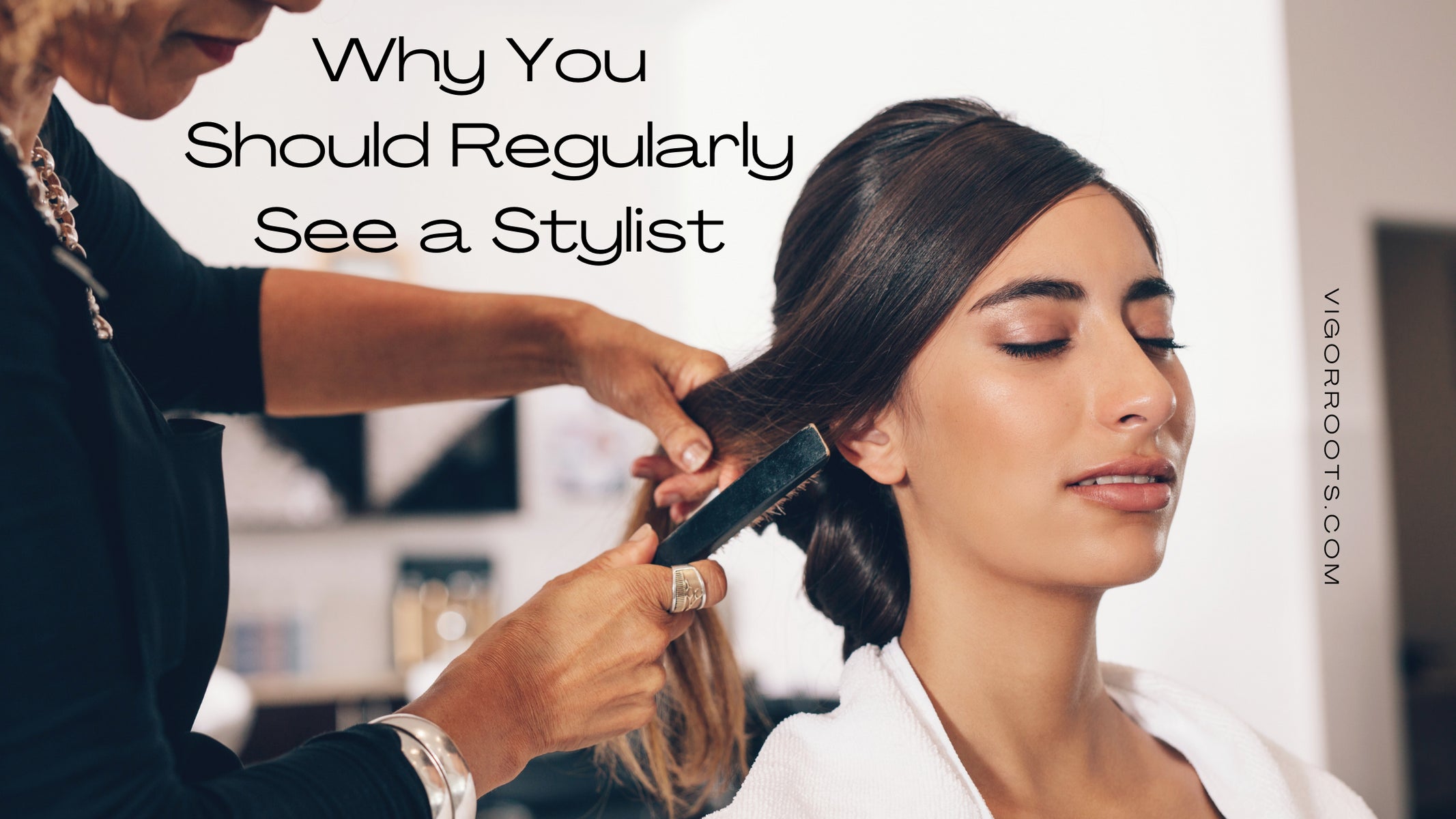
Even though it can be tempting to save some money and go the DIY hair care route, it’s actually quite important for your hair and scalp health to see a professional hair stylist every few months.
Why You Should See a Stylist
A good stylist can upgrade your hair, both in terms of aesthetics and health.

They can recommend:
- Hair styles that suit you
- Ways to protect your hair
- Products for your hair type, style, and condition
- Styling tips
- What heat setting to use with styling tools
- Hair damage, thinning, and loss treatments
- Scalp care routines such as a natural growth serum
- Hair care routines
- How to achieve long term and short term hair goals
Plus, they’ll pamper your scalp with a thorough shampoo and conditioner which not only feels great, but stimulates scalp circulation and promotes hair growth as well.
How Your Stylist Can Help You Improve Scalp Health
Stylists can assess your scalp and alert you to any conditions you will need to treat in order restore and maintain hair health.
Obviously, it’s hard to see on top of and in the back of your own head. A stylist can warn you about any thinning, bald patches, or scalp issues you may not have been aware of.

To the untrained eye, many scalp conditions present similar symptoms such as itching and flaking. However, different conditions require different treatments. For example:
- Sensitive skin
- Dry skin
- Eczema
- Dandruff
- Lice
Your stylist can identify the scalp issue you’re experiencing and point you to appropriate treatments. If you’re experiencing a serious issue, they can let you know you should see a dermatologist.
Remember, it’s always a good idea to treat scalp conditions early on, before they exacerbate to the point of hair thinning and loss. (Also, it’s no fun to live with an angry scalp.) Regularly seeing a stylist can help ensure your scalp stays in good condition.
Stylists can also let you know if you are suffering from a “dead scalp”- a scalp that is unable to grow new hair. This isn’t the end of the world, your stylist will be able to discuss style options moving forward. (And bald is beautiful too!)
How Often Should You See a Hair Stylist?
If you can afford it, Vigor Roots Founder Nathalee DuRose recommends going to a stylist for hair maintenance once a month for best results.
Everyone should see a stylist at least every 3 months for a trim and deep shampoo and condition, she advises.
However, in certain circumstances, you should see a stylist more frequently. Particularly if you want to try an extreme new look.
Some Styles You Shouldn’t Try at Home
About to attempt a bold new style such as dye or chemical straightening? You should definitely see a stylist.
You can seriously damage your hair, scalp, and ability to regrow new hair by improperly applying chemicals and heat.
DuRose cautions that kinky hair types are especially susceptible to damage from chemicals from dyes that are left on too long, because the hair follicle is much thinner than other hair types.
She speaks from experience. Before researching how to have a healthy scalp care routine and inventing Root22Serum, DuRose says perming her hair made it impossible to grow her hair past her ear for years and years and that home coloring caused accidental hair loss.
While it can be tempting to DIY dye and other extreme styles, saving a few bucks in the short term isn’t worth potentially permanent hair and scalp damage. So, see a stylist next time you want to reinvent your hair.
How Do You Find a Good Stylist?
There are many different types of hair and many different types of hair styles. Although stylists have basic info on a broad variety of hair, most tend to have specialties.
DuRose recommends finding a stylist who specializes in your hair type and has lots of experience with the type of styling you want. This is because different hair types require different types of brushes, combs, styling tools, and products.
If you go to a salon that doesn’t regularly work with your hair type, they may not have the products you need on hand.
Make sure to check out reviews and social media to get a sense of potential salon and stylist specialties and results.
What You Should Talk About With Your Stylist at Your Next Appointment
To make sure you get the most out of your next salon visit, plan on talking about the following things:
- Your hair goals
- A detailed account of your current daily hair care routine
- How often you wash, condition, and shampoo
- How frequently you moisturize your scalp
- What products you use
- How often you see a stylist
- Whether you trim or color your hair yourself
- Your styling habits- especially how often you apply heat
A good stylist will recommend adjustments to make sure your routines and habits support your hair goals and health. They can also warn you if you’re doing anything that is unnecessarily damaging your hair or hurting your scalp.
Is Shame Getting In The Way?
Many people are nervous about seeing a stylist exactly when they most need to see a stylist- when they’re experiencing hair and scalp problems.

So, how do you get past the shame that’s holding you back?
“Start by knowing that you’re not alone,” DuRose reassures. “Culturally, we should normalize hair thinning. There are so many people struggling with the same condition.”
Remember, DuRose says, stylists have been trained to assess and address hair and scalp health.
Good stylists will be kind, compassionate, and helpful when you are experiencing issues.
If you’re really nervous to go to a stylist, DuRose invites you to ask her directly for some recommendations. Everyone deserves a healthy scalp and someone to encourage them in the right direction. Feel free to send a direct message to Vigor Roots for some advice. You can also reach out to nathaleed@vigorroots.com or text her at 973-517-3505.
Want to stay informed on how to care for your scalp? Follow us on Instagram for DIY scalp care tips.

